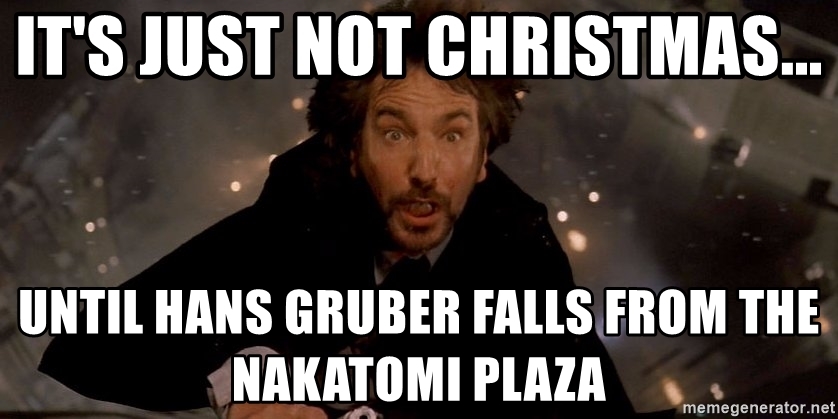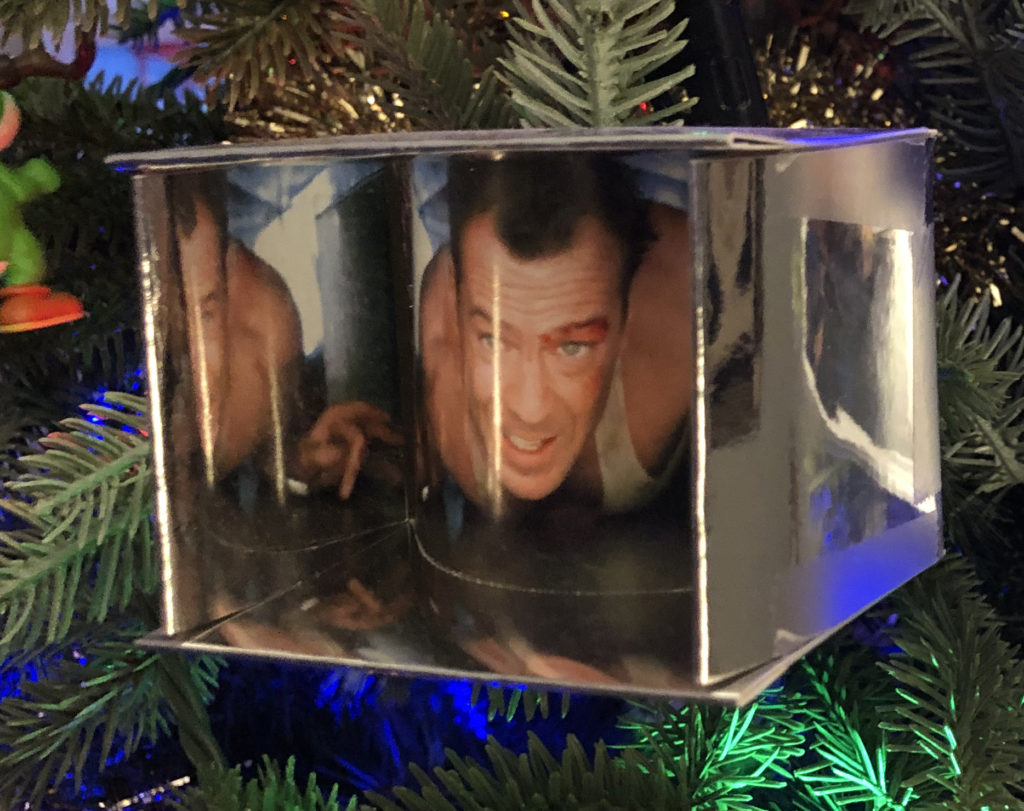
Let’s get one thing straight first: the correct answer to “is Die Hard a Christmas movie?” is “it is if you think it is.”
But lots of people enjoy arguing about this ad infinitum, and as a big fan of Die Hard who watches it every Christmas Eve, I am one of those people.
Before we go further, let me offer my personal definition of a Christmas movie (which is not the definition I will be using to argue my point in this piece): a Christmas movie is any movie that takes place primarily close to or during Christmas and/or features Christmas prominently in the film. Home Alone? Christmas movie. Batman Returns? Christmas movie. Edward Scissorhands? Christmas movie. Gremlins? Christmas movie. Santa’s Summer House? Absolutely dreadful film that takes place during a hot California summer but: Christmas movie.
On the other hand, the final scene of Spider-man: No Way Home (very mild spoiler here) takes place during Christmas – complete with decorations – but since most of the film takes place months earlier, I don’t classify it as a Christmas movie.
However, I understand my personal definition is a bit too broad for many people, and certainly makes it almost too easy to classify Die Hard as a Christmas movie.
So to offer a more rigorous way of determining what constitutes a Christmas movie, I propose using the same rule that is often applied to science fiction. Discriminating (read: snobbish) science fiction readers (and writers) often state that a true science fiction story is one that does not work if you remove the “science” element. Under this rubric, something like 2001: A Space Odyssey is science fiction because it involves humans going into space to investigate something, artificial intelligence, and an adherence to, or at least acknowledgement of, the laws of physics (alien monoliths and stargates notwithstanding). You can’t really tell the same story of 2001 by setting it in, say, feudal Japan.
Star Wars, on the other hand, is famously inspired by the movie The Hidden Fortress, which is set in…feudal Japan. Yes, Star Wars features spaceships, robots and laser guns, but it also features magic (the Force is magic, let’s not argue here), princesses, and faster-than-light travel that makes the vastness of outer space easier to traverse than Beaver Lake. And of course the movies feature sound in space.*
So here’s my proposed definition: a Christmas movie is any movie where, if the Christmas element is removed, important aspects of the story no longer work.
I want to offer some flexibility however. I suspect you could find a torturous way to make any story work without Christmas if you really wanted to, but in many cases this would leave a number of coincidences or plot holes that stretch belief. If simply setting it at Christmas resolves those plot holes easily, then I believe that counts as Christmas being integral to the story.
So let’s look at Die Hard. What are the Christmas elements of Die Hard (and of our experience of Die Hard) and if they were removed, would it still be, in essence, the same film? Would its star** still shine just as brightly in the pop culture firmament?
Let us consider.
John’s visit to LA: John McClane and his wife Holly are separated at the beginning of the film, with John still living in New York and working as a cop, while Holly has a big-time Business Job of some sort with the Nakatomi Corporation in Los Angeles. As the film begins, John is landing at LAX to visit his family for the holidays – and see them for the first time in several months.
Now, obviously John could come visit his family at any time, or for any holiday. But he has to take significant time off work (as an essential worker, mind you) and fly across the country – an expensive and time-consuming proposition. So why would John put so much effort into flying out to see his family? What time of year, more than any other time of year, would he want to be there for his children? Seems like Christmas works pretty well, right?
The Nakatomi Office Party: The Nakatomi Christmas party is a key element to the story. The terrorists’ plan requires the building to be mostly empty, but for some of the Nakatomi staff – particularly its president, Joe Takagi – to be present. There are two reasons for this: one, for the small chance that Takagi can give them the codes for the safe, and two, so they have enough people to create a hostage situation worth bringing in the FBI (but not a building full of people, as trying to track and control them all would be impossible – hell, they couldn’t even keep track of the one guy they missed at the party).
It’s possible the Nakatomi Corp could have parties for other reasons (such as landing a big account or something), but if you’re trying to plan a terrorist operation months in advance, it’s a lot easier to just wait for the inevitable Christmas party.
“Now I have a machine gun – Ho Ho Ho”: After dispatching one of the terrorists, John takes his weapon and sends him back down to the terrorists on the elevator, having written the above message (in blood) on the man’s sweater. While this is one of the most memorable seasonal elements in the film and often quoted (and the corpse is wearing a Santa hat), I will admit this particular element isn’t necessary to the plot. John could have written any taunt – such as “yippee-ki-ay mother****er” – on the sweater (with maybe a cowboy hat?) and the gag would still have worked.
The Taped Gun: At the end of the film, John is able to fool the villains by taping his gun to his back with packing tape labeled “Season’s Greetings.” This is a distinctly Christmas touch, but the question is, would it work without the Christmas aspect?
I think the answer is probably yes – although a small part of me wants to argue that that tape might not have been there without the need to wrap holiday packages.
The Soundtrack: The soundtrack isn’t part of the story, but it is an integral part of the experience of the film. And composer Michael Kamen leans hard into the Christmas theme. Most distinctive are the jingle bells that are often heard at important beats (such as when John spots the packing tape as described above). And of course, there’s “Ode to Joy” (not originally a Christmas tune, but now often associated with it), which sneaks into the score several times before culminating in the iconic sequence when the safe is opened (tagged with Theo’s “Merry Christmas” line). Kamen also weaves motifs from “Winter Wonderland” and “Let It Snow! Let It Snow! Let It Snow!” into the score.
Finally, there’s the presence of Run-DMC’s “Christmas in Hollis” (which McClane explicitly objects to as Christmas music) and then the full “Let It Snow! Let It Snow! Let It Snow!” playing (ironically, given the Los Angeles setting) over the credits.
I do think Die Hard would be a different film without the Christmas aspects of the soundtrack. These touches add a memorable charm to the film that stands in stark contrast to its increasingly inferior sequels.
The Film’s Continuing Pop Culture Prominence. My final argument is admittedly even less tangible than the soundtrack, but here it is: the Christmas setting is why Die Hard has remained so prominent in pop culture.
Yes, it’s easily the best of all the films, but Die Hard with a Vengeance is considered to be a good action movie by many. I personally think Die Hard 2 is underrated. But ask yourself: do you know anyone who watches those movies annually? Now ask yourself: do you know anyone who watches Die Hard annually? (Hint: if you know me, then yes, you do.) If you do know someone who watches Die Hard annually, do they do it at Christmastime? (Again, if you know me: yes.)
I didn’t create the meme at the top of this article; someone else did. But I did make this (based on a design I saw online).

And someone wrote this:
And finally, and most importantly, every single year at Christmastime, people around the world gather together…
…to argue endlessly about whether Die Hard is a Christmas movie. What I’m saying is that even those arguing that Die Hard isn’t a Christmas movie are contributing to the relevance of its Christmas-ness; that the film’s Christmas-ness (regardless of whether they think it should be classified as a Christmas movie or not) is a part of what they think about when they think of Die Hard.
There are many other well-known action movies set at Christmas, including Lethal Weapon, Ronin, First Blood, The Long Kiss Goodnight, and The Bourne Identity. But there aren’t lots of custom Lethal Weapon ornaments or children’s Christmas books based on The Long Kiss Goodnight. The Internet being what it is, I’m sure there are people who argue about whether those are Christmas movies or not, but there aren’t countless online articles about them every single Christmas. Why? Because the Christmas setting isn’t that prominent or important to their stories.
But that’s not the case with Die Hard. The strange magic of the holiday season is woven deeply in the fabric of the film, resulting in a film that bizarrely, and despite dozens of shootings, massive explosions, and a guy pulling glass out of his bloody feet, delivers a feeling of exhilarating joy.
And so I believe Christmas is an integral part of most people’s experience of Die Hard – which makes it a Christmas movie. Without its Christmas setting, it’s likely Die Hard would have enjoyed a status like other great action films such as Commando or Speed – popular in its time, forever appreciated by fans of the genre, but not the permanent pop culture touchstone it is today.
* Although the super-nerd in me is often tempted to explain this by positing that the Star Wars galaxy is filled with an unknown invisible substance that carries sound.
** of Bethlehem
